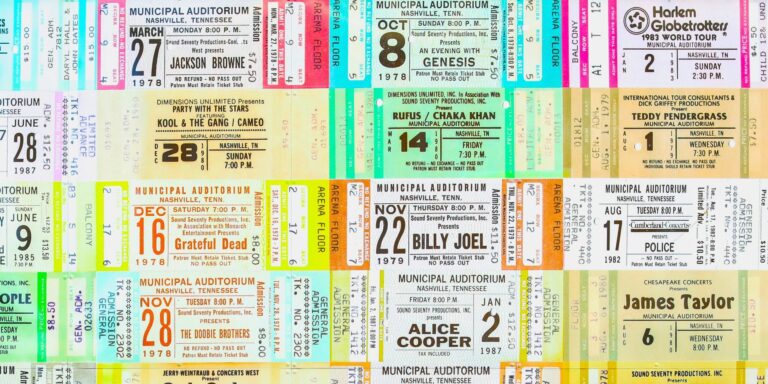The way we experience live music has undergone a significant transformation in the last decade, largely due to advancements in technology. Innovations in digital ticketing, dynamic pricing, and blockchain verification have reshaped the concert ticketing landscape in 2025, offering fans new levels of convenience and security. While these technological strides promise an improved experience, they also come with a range of challenges, particularly regarding accessibility, pricing fairness, and potential exploitation of fans. As the industry navigates these changes, the balance between embracing technology and ensuring fair access to live music becomes more crucial than ever.
Digital ticketing has undoubtedly revolutionized how fans purchase and manage tickets. No longer do concertgoers have to wait in long lines at box offices or deal with the hassle of losing or damaging physical tickets. With platforms like Ticketmaster and AXS, fans can easily purchase tickets online, have them delivered instantly to their mobile devices, and store them digitally for future use. This convenience extends beyond the initial sale, making ticket transfer and resale smoother than ever. Fans can now easily pass along or resell tickets with just a few taps, eliminating the need for physical exchanges or the complications of manual ticket transfers.
This digital-first approach also addresses some of the logistical challenges that have historically plagued the ticketing process. For example, large-scale events that require massive coordination, such as concerts in arenas or stadiums, can now operate much more efficiently with the help of digital systems. The ability to track ticket sales in real-time allows event organizers to better manage demand and make adjustments as needed. Additionally, mobile ticketing reduces the chances of counterfeiting, ensuring that fans receive authentic tickets and reducing fraud risks.
However, while digital ticketing has made the process more efficient, it has also brought about significant challenges, particularly when it comes to pricing. The introduction of dynamic pricing, where the cost of tickets fluctuates based on demand, has raised concerns among fans. In essence, ticket prices for a concert can rise as demand increases, often leading to exorbitant fees for highly anticipated shows. For example, fans eager to see a popular artist may find themselves paying several times the original ticket price due to surge pricing, which can occur minutes after tickets go on sale. The volatility of ticket costs has led many to question whether these practices are fair to the average fan.
The practice of dynamic pricing is often criticized for pricing out devoted concertgoers who cannot afford to pay premium prices for popular shows. While this model benefits the organizers, artists, and ticketing platforms by maximizing revenue, it can leave many fans who are not willing or able to pay inflated prices locked out of the experience. Moreover, the introduction of “platinum tickets” and exclusive VIP packages has exacerbated this issue, with some tickets being sold at prices well beyond what many fans are willing to pay. These tickets often include premium seating, backstage access, or other perks, but their high cost makes them out of reach for a large portion of the audience. For many fans, these practices contribute to a growing sense of exclusion in a live music environment that was once more egalitarian.
While these pricing strategies may benefit the financial bottom line, they are creating a divide between the most affluent concertgoers and those who simply want to see their favorite artists perform without breaking the bank. The rising cost of live events, driven in part by technology’s role in ticketing, has the potential to alienate fans who do not have the financial means to compete in an environment that increasingly prioritizes profit over accessibility.
Blockchain technology has emerged as a potential solution to some of these challenges, particularly regarding the resale market. By providing a transparent, secure, and tamper-proof record of ownership, blockchain could help prevent scalping and ensure that resale prices remain fair. With blockchain, ticket resales could be regulated, ensuring that tickets are not sold at exorbitant prices. Additionally, it could help combat counterfeit tickets, which have long plagued the industry. However, while the promise of blockchain is significant, its full potential has yet to be realized, and its implementation could introduce new complexities that need careful consideration.
As we move into 2025, the live music industry finds itself at a crossroads. The technological innovations that have streamlined the ticketing process offer undeniable benefits, such as greater convenience and enhanced security. But these advancements also highlight a growing divide between industry profits and fan access to live performances. The rise of dynamic pricing and premium ticketing options has made it more difficult for many concertgoers to afford tickets, while the increasing reliance on digital systems raises concerns about fairness and transparency. As the industry continues to evolve, it will be crucial for venues, ticketing companies, and artists to find ways to balance technological progress with accessibility, ensuring that the live music experience remains available to all fans, regardless of their financial situation.
Ultimately, the challenge for the industry will be finding a way to embrace the benefits of technology while addressing the negative impacts on affordability and fairness. By exploring new models of ticketing that take into account the realities of digital advancements, the live music industry can continue to thrive in a way that benefits both artists and fans. Whether through greater regulation of pricing practices, increased transparency in ticketing systems, or more equitable distribution of tickets, the industry must adapt to ensure that live music remains an experience for everyone, not just the privileged few.


